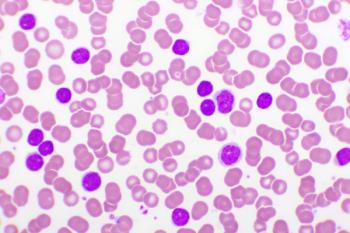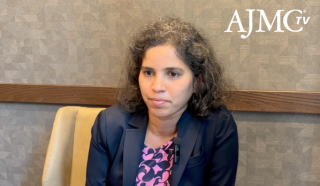
Hematology
Latest News
Latest Videos

CME Content
More News

Patients with acute myeloid leukemia (AML) in remission for over 3 years experience survival rates comparable with a matched cohort from the general population.

Positive topline data from the phase 3 BRUIN CLL-313 showed pirtobrutinib's efficacy in the frontline setting.

The LINKER-SMM1 trial evaluates linvoseltamab's safety and efficacy in high-risk smoldering multiple myeloma, aiming to delay disease progression.

Drug interactions with ibrutinib may not shorten survival when managed carefully, though the significant increase in infection-related hospitalizations tied to CYP3A inhibitors signals an urgent need for closer monitoring, dose adjustment, and proactive infection prevention strategies.

Outpatient treatment with axi-cel shows promising response rates for relapsed large B-cell lymphoma, enhancing accessibility in community oncology settings.

Underdosing, poor spleen response, and transfusion dependence drive inferior survival outcomes in intermediate-1 myelofibrosis.

Among patients with hematologic malignancies who were diagnosed with COVID-19, about one-quarter experienced critical illness, and most of those patients died.

Cilta-cel demonstrates superior efficacy and durability in treating high-risk myeloma, balancing effectiveness with safety concerns for patients.

Despite reduced immune responses, immunization lowers infection rates and remains central to supportive care in patients with multiple myeloma.

The findings could help clinicians individualize infection-prevention strategies in patients with relapsed or refractory chronic lymphocytic leukemia (CLL).

Outcomes in accelerated-phase (AP) or blast-phase (BP) myeloproliferative neoplasm (MPN) differ from AML, and AML-based frameworks may not fully capture prognosis in this population.

Patients with severe sickle cell disease experienced significant quality of life improvements after receiving exagamglogene autotemcel gene therapy.

A single-center study comparing patients with chronic lymphocytic leukemia receiving venetoclax as part of a clinical trial and patients receiving it in routine clinical practice showed very high complete response rates in both groups.

Despite the findings, existing data around cardiovascular risk in chronic lymphocytic leukemia (CLL) are limited, and more comprehensive information is needed to draw strong conclusions.

Novel 3D analysis reveals core tumor niches drive resistance through AP-1 signaling and stromal reprogramming.

Investigators believe the SWIFT-seq system holds potential to replace more invasive bone marrow biopsies.

Patients with chronic lymphocytic leukemia (CLL) had significantly lower monocyte-to-lymphocyte ratio values compared with healthy controls.

Emerging data suggest that isatuximab‐KRd and daratumumab‐KRd produce superior depth of response compared with KRd alone, with sustained MRD negativity and encouraging progression‐free survival in NDMM.

Patients with myeloproliferative neoplasms (MPNs) appear to be at a higher risk of heart failure and pulmonary hypertension, though more research into the links is needed.

Men fared better under surveillance, while women benefited more from targeted therapies for the treatment of chronic lymphocytic leukemia (CLL) in a new study.

Artificial intelligence (AI) and socioeconomic factors enhance risk stratification for patients with acute myeloid leukemia (AML) post transplant, aiming to reduce hospital readmissions and disease progression.

A rare case report describes a young woman whose relapse of AML following MPN coincided with severe worsening of pulmonary hypertension, highlighting the need for vigilant cardiopulmonary monitoring in hematologic malignancies.

The QRISK3 assessment is designed for the general population, but it appears to also have utility in patients with essential thrombosis and polycythemia vera.

Pirtobrutinib had a nominally superior overall response rate compared to ibrutinib in certain patients with chronic lymphocytic leukemia (CLL) or small lymphocytic lymphoma (SLL).

Cilta-cel’s mechanism of action allows it to penetrate challenging areas of multiple myeloma, providing deep and durable responses even in high-risk patients, explains Surbhi Sidana, MD, MBBS, Stanford University. Still, safety trade-offs should always be a consideration, she adds.

















